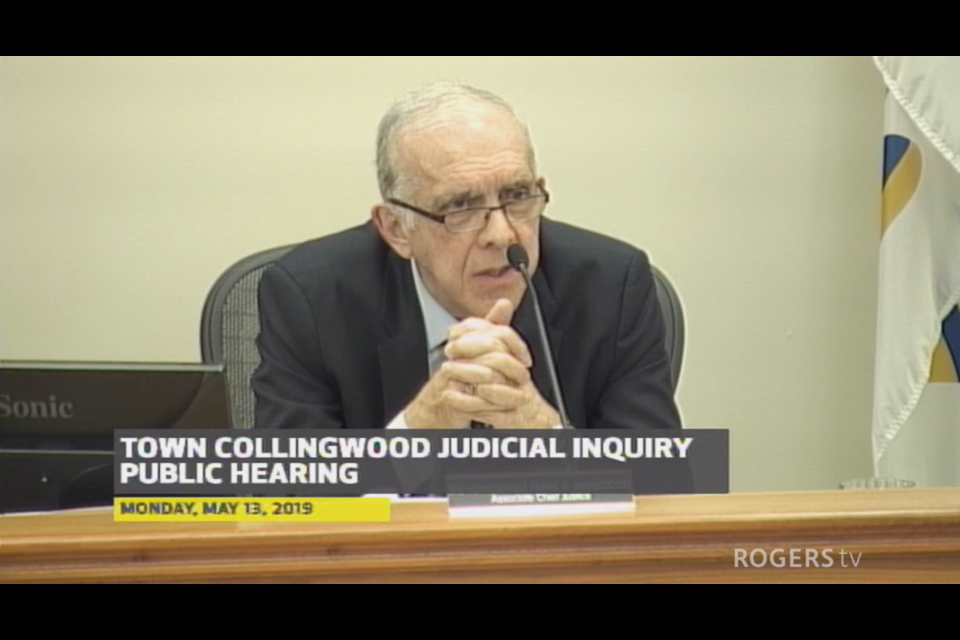Though councillors didn’t get to see the full submissions made by all the bidders in the 2012 Collus share sale, one member of council testified they received enough to make an informed decision.
Former Collingwood councillor Kevin Lloyd took the witness stand today as the final witness in the phase one evidence of the judicial inquiry.
Due to a ruling by Associate Chief Justice Frank Marrocco, Lloyd’s evidence was limited to the question of whether or not council understood the financial component of the deal before voting on it.
Lloyd told the inquiry he remembered a few occasions where individuals, including Ed Houghton, John Rockx, and Ron Clark, explained the financial details to councillors.
Houghton was the president and CEO of Collus at the time. Rockx was a consultant with KPMG, the firm hired to consult on the request for proposal and bidder selection process. Clark was a lawyer with Aird and Berlis, the firm hired by the town and later by Collus.
“Basically … Hydro One’s offer was the highest and PowerStream was the second highest, and the breakdown of what they were offering was slightly different,” said Lloyd. “PowerStream was the only one that was going to return the full recapitalization dollars.”
Lloyd said he understood PowerStream’s offer to the town was $8 million for 50 per cent of the shares, repayment of a loan from the town of $1.71 million, and the proceeds from recapitalization (refinancing the utility’s debt-equity ratio) to the tune of $5.3 million. The sum of those parts totalled $15.01 million, which was the “total cash consideration to the town,” referred to in a chart that was included in a presentation to council on Dec. 5, 2011. (See above)
At that in-camera meeting on Dec. 5, 2011, council voted to select PowerStream as the winning bidder and negotiate a sale with them.
Ryan Breedon, one of the lawyers representing Collingwood in the inquiry, asked if councillors received copies of the full submissions from each bidder (Horizon, Hydro One, PowerStream, and Veridian).
Lloyd said they did not, and he confirmed the Dec. 5, 2011 in-camera presentation was the only time council was provided with information for all four bidders. After that time, PowerStream was selected, so discussions centred around PowerStream’s offer.
In the same presentation, Hydro One’s “total cash consideration for the town” is listed as $15.998 million.
“Did anybody tell you what Hydro One was offering?” asked Breedon, referring to the cash offer for the 50 per cent of shares.
Lloyd said he couldn’t recall if or when the specific Hydro One offer for shares was, but referred Breedon to the chart from the Dec. 5, 2011 presentation that listed the total offer at $15.998 million, saying it showed Hydro One was offering the loan repayment ($1.71 million), half of the recapitalization dividend ($3.2 million) and another $11 million for the shares.
“When you look at the totals … there’s only a $900,000 difference,” said Lloyd, comparing PowerStream’s offer to Hydro One’s.
In fact, Hydro One offered $13 million for the shares, but one of the consultants from KPMG reduced the amount of the bid in a comparison chart, stating he wanted to make an apples-to-apples comparison.
The deductions made were for what he thought were unassumed liabilities not included in Hydro One’s offer. When he made the deduction he told the Strategic Partnership Task Force he needed to clarify with Hydro One to confirm if those deductions were necessary or if, indeed, Hydro One would be paying $13 million.
There’s no evidence to suggest the deductions were explained to council at the Dec. 5 meeting.
“Did you know [Hydro One] offered $13 million?” Breedon asked Lloyd.
“Specifically, I can’t recall,” responded Lloyd.
“Do you think that’s something council should have known?” asked Breedon.
“In the overall scheme of things, with the bottom lines, no I don’t think so,” said Lloyd. “I was looking at total figures.”
Lloyd testified he was comfortable with the explanation of the financial components he, as a councillor, received during the sale process.
Ultimately, the town did not receive $15 million for the 50 per cent sale of Collus to PowerStream.
Prior to the sale (April 12, 2012) council voted not to call in the promissory note on the loan to Collus, which reduced the $15.01 million offer to $13.3 million.
On July 24, 2012 (seven days before the sale documents were finalized), the recapitalization dividend was calculated at $4.09 million, which is down from the initial $5.3 million included in PowerStream’s offer.
Lloyd testified he always understood the recapitalization dividend was an “estimate” and it wouldn’t be certain until the 2011 financial documents from Collus were complete.
The final sale was $12 million for the town, excluding costs of the transaction.
The Hydro One offer included half the recapitalization dividend ($2 million after the reduction to $4.09 million calculated in July, 2012), and $13 million for the shares. Even without the $1.71 million promissory note, the total for the town could have been $15 million, excluding costs of the transaction.
There will be no more hearings for phase one of the Collingwood Judicial Inquiry, which is the part of the inquiry dealing with the decision to sell 50 per cent of Collingwood Utility Services Corporation to PowerStream in 2012.
On Sept. 9, hearings will begin for phase two, which is the part of the hearing dealing with the decisions made on how to spend the $12 million proceeds of the sale.
